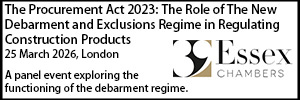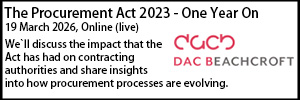Breach during procurement "not sufficiently serious to justify an award of Francovich damages", High Court judge rules
- Details
An error in the award of an NHS orthodontic contract was not serious enough to entitle the loser to Francovich damages, the High Court has found.
In Braceurself Ltd v NHS England [2022] EWHC 2348 (TCC) Alexander Nissen KC, sitting as a deputy judge of the High Court, found provider Braceurself had suffered insufficiently serious damage to be entitled to a Francovich award of damages and that the NHS’s error had been excusable and the provision of public services was unaffected.
The damages claimed were the sum of £4.7m for loss of profit, bid costs of £26,500 and loss of goodwill, which was not separately quantified.
The case concerned the orthodontic services contract for east Hampshire.
Braceurself was the incumbent contractor but was beaten by only 80.25% to 82.5% by rival bidder Orthodontics by Eva Petersfield & Alton in the contract scoring.
The court heard this had included an assessment of the accessibility of each applicant’s premises.
Braceurself was on the first floor of a building and it proposed to install a stair climber to assist those who could not climb the stairs themselves.
This was misunderstood by the NHS to refer to a stair lift. The NHS also concluded that Braceurself intended to offer services at alternative premises to those patients who could not use the stairs, where the equipment would not be of the same standard.
Braceurself in fact had proposed this only as an alternative in case of flood or fire damage.
Had it been scored correctly on this point it would have overtaken its rival given the narrowness of the margin.
Mr Nissen said in his judgment: “Having established that, in principle, it can be relevant to take account both whether the breach was inadvertent and the purposes of the infringer, I now turn to the facts of this case.
“I am satisfied that, in this case, it is relevant to take into account that the breach was inadvertent, rather than deliberate, and self-evidently occurred in good faith. I am also satisfied that the [NHS’s] purpose in carrying out the scoring…was to maximise access to publicly funded orthodontic services for those who have a disability. Its purpose was therefore a laudable one.”
He said Braceurself would have earned £2.7m over the seven-year contract and so its loss was “not existential”.
The judge explained: “In this case, it is relevant that this was a competition in which the scores were extremely close.
“It can truly be said that the broader public would have been almost equally well served by either practice. Although the result of the competition should, narrowly, have tipped the other way it cannot really be said that the wider public access to orthodontic services within the lot area has been materially affected in any way.”
Judge Nissen said he had reached a firm conclusion that the breach “was not sufficiently serious as to entitle the claimant to a remedy in damages.
"The phrase ‘sufficiently serious’ indicates that a fairly high threshold must be passed before it can be said that the test has been satisfied and…I do not consider it to have been in this case.”
He said the errors made by the NHS were “both at the excusable end of the spectrum and minor” and were “inadvertent, rather than deliberate, and self-evidently occurred in good faith” and there was no material impact on the public.
Commenting on the case, Fenella Morris KC and Benjamin Tankel of 39 Essex Chambers, who appeared for the NHS, said: “Deputy High Court Judge Alexander Nissen KC, returning to the speeches of Lords Clyde and Hope in Factortame, held that the manifest error was inadvertent, made with the purpose of maximising access to those with a disability, excusable, and had no impact beyond the challenger to the procurement.”
Mark Smulian
Sponsored articles
Unlocking legal talent
Walker Morris supports Tower Hamlets Council in first known Remediation Contribution Order application issued by local authority
Legal Director - Government and Public Sector
Commercial Lawyer
Locums
Poll
15-07-2026 11:00 am


















































